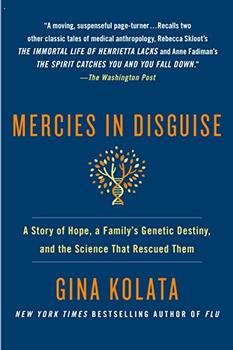Summary | Excerpt | Reading Guide | Reviews | Beyond the Book | Readalikes | Genres & Themes | Author Bio

A Story of Hope, a Family's Genetic Destiny, and the Science That Rescued Them
by Gina KolataExcerpt
Mercies In Disguise
The phone rings. The California doctor is on the line. "Are you ready, Amanda?" her therapist asks.
Tim Baxley never even got the name of the woman who told him the story that set the horror in motion. It was a June evening in 1998 and Tim was at the end of the receiving line at a viewing the night before a funeral — his father's funeral.
Tim's father, Bill Baxley, had been a chemical engineer at a local packaging plant. Tall and imposing, with a stern and serious face, he had been a deacon in his church and head of the Sunday school program.
The Baxley family had lived in or near Hartsville, South Carolina, for generations. A town that, with its suburbs, comprises 21,000 people and 16 churches — eight of which are Baptist. It is a deeply Christian population in the heart of the Bible Belt.
The lure of the town, its magnetic appeal for the Baxley family and many others, is its sense of community. Residents cherish family life — restaurants close on Sunday nights so employees can eat dinner at home with their families. High school sports make front-page news in the town's paper. The church basketball teams take time-outs during the games for devotions. It is a place of conservative tradition, of exacting conformity, stifling to some but a comfort to those who have come to feel that Hartsville is their true home.
Bill Baxley proudly fit in. So staunch a patriarch and so perfect a picture of traditional southern living was he that, in 1985, he was awarded a plaque from Gov. Richard Riley naming his clan South Carolina Family of the Year "in recognition of the exemplary qualities of family life exhibited by the William H. Baxley Jr. family."
It was a confirmation of Bill's belief, shared by his family, that the Baxley clan was special, maybe even indestructible — certainly a testament to the grace conferred by faith, discipline and hard work. Even Bill's viewing at the funeral home seemed to confirm this belief.
Tim knew the respect his father commanded, yet he was still astonished by the size of the crowd that night. The viewing was supposed to start at 6 p.m. and end at 8, but people lined up outside the door at 5:45. The last did not leave until 10. Hundreds arrived — more than the funeral director had ever seen — a steady stream of people coming despite the thick heat of that June evening.
The Baxley men were readily identified by strong, dark brows shading large, dark eyes, a head of thick chestnut hair, a narrow oval face and a straight, angular nose. They all had a sensuously full upper lip with a pronounced Cupid's bow. From generation to generation, the Baxley boys looked so similar that it was difficult at times to tell them apart.
But this man in the casket — this man looked nothing like Bill Baxley. He was a stranger. A rippled sateen pillow tipped a shriveled face up to the line of passing mourners. Bill's gray hair had been pulled back, the skin drawn tight against his forehead. Heavy makeup was smeared over the scar where his brain had been removed in a vain attempt to figure out the illness that had robbed him of his life. His favorite charcoal gray suit hung loose on his shrunken body; his red tie with a South Carolina emblem did nothing to draw the eye from the desolation of his body.
Tim was at the front of the receiving line, standing ahead of his older brothers, Billy, Mike, and Buddy. He glanced back at his mother — tiny, frail-looking Merle — who stood near the entrance to the room where her husband's casket lay. Between greeting visitors, Tim observed his mother shake well-wishers' hands and acknowledge their sympathy. She was bearing up better than he had dared to hope. He developed a kind of rhythm. He'd accept a "sorry for your loss" with a grateful smile and then turn his head to see his mother doing the same thing.
From Mercies in Disguise by Gina Kolata. Copyright © 2017 by the author and reprinted by permission of St. Martin's Press.
Your guide toexceptional books
BookBrowse seeks out and recommends the best in contemporary fiction and nonfiction—books that not only engage and entertain but also deepen our understanding of ourselves and the world around us.